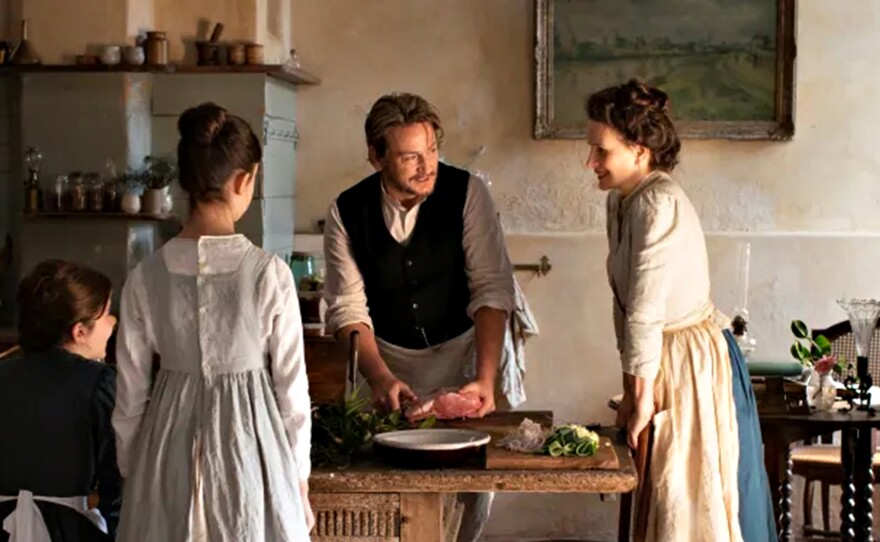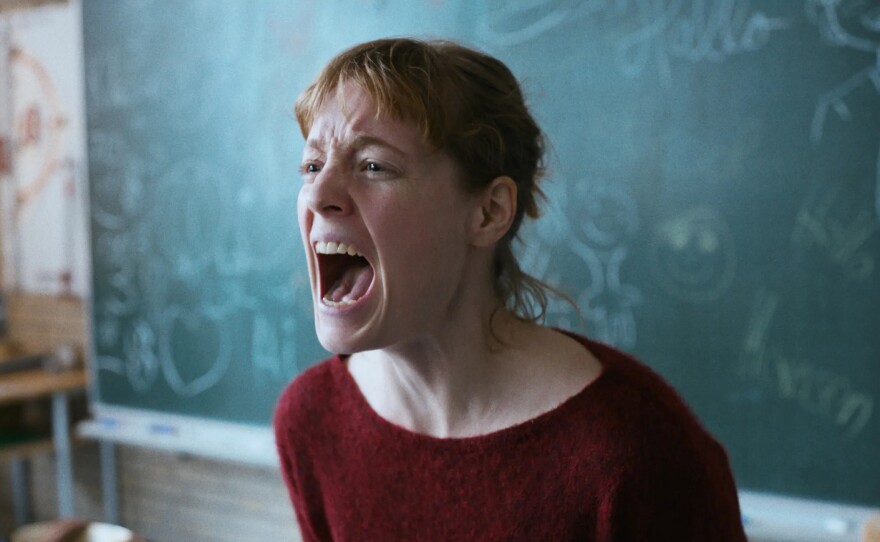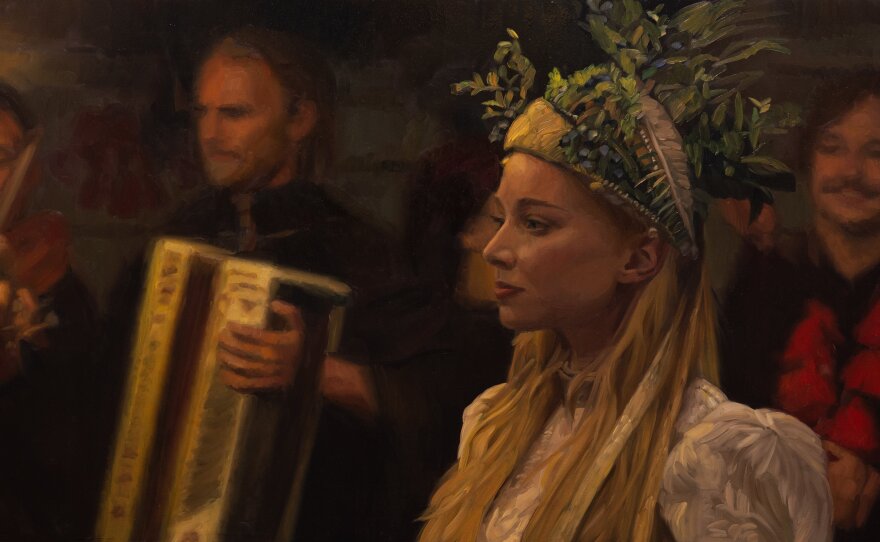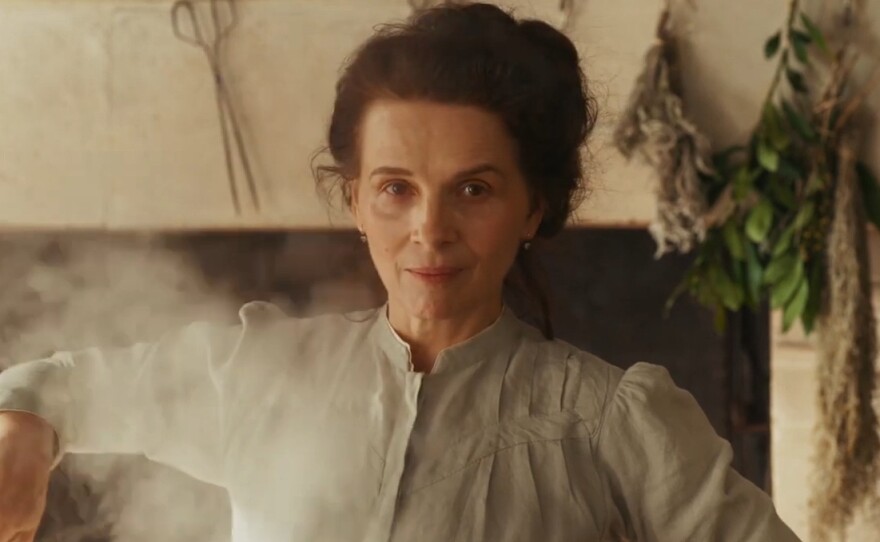Here is a cinematic menu for your weekend viewing.
The gourmet meal: "The Taste of Things"
Not since "Babette's Feast" have I wished I could smell and taste a film as much as "The Taste of Things" (opening Friday at Digital Gym Cinema.
Vietnamese-born French director Trần Anh Hùng used Vietnamese food to flavor his debut feature "The Scent of Green Papaya." Now he returns to the kitchen for some elaborate French cuisine in "The Taste of Things," based on Marcel Rouff’s novel, "The Passionate Epicure."
Set in 1885, the film depicts the relationship between Eugenie (Juliette Binoche), an exquisitely talented cook, and Dodin-Bouffant (Benoît Magimel), the gourmet she has worked for, for the past 20 years.
The film immediately gets to the joys of food — the preparation, the cooking, the eating, the way it can change someone's day. The extended opening is just food prep with an eye for every step of the process and all the care that goes into making a meal. There is almost no dialogue, yet we learn who these people are because of the intense focus and craft they display, as well as the concern and joy they take in what they are doing.
As someone who loves to cook, eat, and feed people, this film was the most satisfying and delectable form of comfort food. It may not appeal to people who love fast food and things you pop in a microwave, or to vegans since the French indulge in a lot of delicacies that would likely offend (specifically the preparation of ortolans, an expensive and now illegal delicacy). But if you take delight in feeding others or have ever felt like you might cry because something tasted so good, then this is the movie for you.

Eugenie and Dodin have a partnership that is more rooted in food than emotions (or maybe I should say that all their emotions seem to revolve around food). Each dish is a work of art, each meal is a carefully constructed narrative, and the entire experience borders on the sensuous and the religious. The idea of creating a new dish fills them with giddy excitement. And the way they show their love is to craft a dish or meal that caters to what they know will please the other’s palate. Eugenie may be the more talented cook but the film allows Dodin to use food as a means of winning over Eugenie to the idea of marriage and as the best medicine for bad health.
Binoche and Magimel give performances that are in perfect synch with each other. While so many actors look for big emotions and histrionics to get attention, Binoche and Magimel achieve so much with just a small smile or twinkle in their eyes. This is a film about subtlety and delicacy — both in terms of the flavors Eugenie creates in the kitchen and the emotions Trần conveys in the film. But both the food and the film are capable of making a big impact in elegant and graceful ways.
Trần gives the film — especially the kitchen and dinner table — a warm, inviting glow. Even when I have no interest in actually eating a particular dish, the way it is presented in the film is intoxicating and makes it look so tantalizing that I wanted to lick the screen. This is definitely for the slow food movement as a meal here can take what seems like a day to create and then consume, as course after course is bought out.
These folks put Hobbits to shame with elaborate dinners that seem likely to induce a food coma. I love that at one point Dodin has just indulged in an epic but not well-crafted meal, he dismisses it as a "parade with no organization" from a Prince. Eugenie then recounts that when he came home she made him just a clear broth ... but then lists another dozen items that he consumed.
At a time when everyone seems consumed by getting things fast, and not expending time or energy on such daily tasks as preparing a meal, "The Taste of Things" reminds us of the rewards of putting time and effort into something and then taking the time to savor it.

The deceptively filling appetizer: "Perfect Days"
There should be an award just for Kôji Yakusho's smile in "Perfect Days" (playing at Angelika Film Center and AMC UTC), a film that seems small and simple in appearance but has great depths of flavor.
Yakusho has been Kiyoshi Kurosawa's go-to actor for years but it is great to see him in a radically different role. For director Wim Wenders he plays a man who cleans public toilets (a decidedly unpleasant job that he tackles with efficiency and pride).
Wenders has such a great knack for character studies and this one is so elegantly simple and perfect. Yakusho barely has any lines but every time he smiles the screen just lights up, and you fall in love with his character a little more. Sometimes he smiles at a song or the way a shadow plays on a wall or finding a potential bonsai tree. But his ability to find something to smile at every day is enchanting.
There are little black and white interludes — dream, flights of fancy, not sure which — and it reflects the black and white photos he snaps everyday.
At a time when it is so easy to find things to be upset about it feels almost daring to focus on these small joys. Great soundtrack too.

A savory main course: "The Teachers' Lounge"
Much darker and full of anxiety is "The Teachers' Lounge" (moving to Regal Edwards San Marcos and Regal Oceanside), this is a hearty and complex stew of dramatic tension.
"The Teachers' Lounge" feels a kindred soul to "Anatomy of a Fall." The stories are vastly different but there is a way that both filmmakers find things in seemingly simple real lives that can be horrific or anxiety inducing. And then both craft unexpectedly riveting films from these foundations.
"The Teachers' Lounge" begins innocuously enough. When one of Carla Nowak's students is suspected of theft, she decides to investigate to clear him because she idealistically wants to challenge the racial stereotypes she feels are in play. But things are not so simple. Her good intentions quickly go awry and the consequences of her actions shake her to her core.
Leonie Benesch calibrates her performance as Carla perfectly. She makes her complex, flawed, naïve, brave, and above all human. I love characters that are not easy to figure out and that stir mixed emotions.
Director and co-writer Ilker Çatak displays an assured hand that only falters at the end. He explores politics, school policies, and human nature to suggest how difficult it can be to navigate the modern world and to try and stand up for what you believe in. He creates a stress-filled narrative and builds tension that — as with "Anatomy of a Fall" — feels much like the beats of a horror film.

A bittersweet dessert: "The Peasants"
"The Peasants" (opening Friday at Landmark's Hillcrest Cinemas and Angelika Film Center) serves up something even more horrific but it is wrapped up in a beautiful package.
"The Peasants" is the follow-up to the Oscar-nominated animated feature "Loving Vincent" by directors D.K. Welchman and Hugh Welchman. Both films are rendered with a striking, hand-painted animation technique.
"The Peasants" is based on the novel by Polish author Władysław Reymont and tells the story of Jagna, a young woman challenging the confines of her late 19th century Polish village that is dominated by viciously gossiping women, ruled by patriarchy, and marked by on-going feuds. The only thing that binds the community — both rich and poor — is a connection to the land and traditions.
The animation style is mesmerizing and its beauty sometimes contrasts starkly with the harshness of the story. The story it tells is familiar but it finds the details to make it feel specific and a visual style to make it feel fresh. And stay through the end credits to get a glimpse into the animation process.
So this weekend has anything to satisfy your cinematic appetite.






